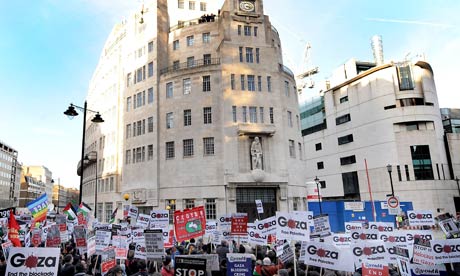
Protesters demonstrate outside the BBC building in London. Photograph: Andy Rain/EPA
The BBC came under renewed pressure yesterday to broadcast an emergency appeal for Gaza on behalf of the Disasters Emergency Committee (DEC) after it received more than 10,000 complaints about its refusal to show the film.
More than 50 MPs will back an early day motion in the Commons today urging the BBC to reverse its decision. Douglas Alexander, the international development secretary, Ben Bradshaw, the health minister, and Hazel Blears, the communities secretary, all criticised the BBC. Shahid Malik, the justice minister, said he had not met anyone who supported the BBC's stance.
Dr Rowan Williams, the Archbishop of Canterbury, said the BBC should broadcast the appeal by DEC, an umbrella group of humanitarian charities including Oxfam, Save the Children and the Red Cross.
The appeal will be shown tonight on ITV, Channel 4 and Five. But the BBC is arguing that by screening the humanitarian appeal the corporation "could be interpreted as taking a political stance".
The Guardian understands that Brendan Gormley, DEC's chief executive, assured senior BBC executives that the money raised was "for all those affected by the recent conflict", including people in southern Israel. But the BBC said last night: "Whilst our records show that DEC stated in principle the aid could be applied to a wider area, they clearly indicated that the situation with Israel was unlikely to need the help of the appeal and in practice the request was solely for Gaza."
Mark Thompson, the BBC's director general, said in a blog over the weekend that the "fundamental reason" the BBC refused to broadcast the appeal was to preserve its perceived impartiality.
In discussions after the DEC's Gaza appeal proposal was lodged, Gormley is understood to have told BBC executives the appeal would not just be for Palestinian victims of the conflict. "The DEC appeal is for those suffering as a result of the Gaza conflict. The greatest unmet need is in Gaza itself," a DEC spokesman said yesterday. "But DEC members are working in Gaza and Israel, and the Red Cross movement have helped to evacuate people living in southern Israel. We believe that the availability of aid to both Gaza and Israel was understood by the BBC."
ITV was producing the two-minute appeal last night, which will be shown on the channel before the main news at about 6.25pm tonight. The film will be disseminated to other broadcasters and websites, including Channel 4 and Five. John Ryley, head of news at Sky, was consulting senior colleagues last night about whether it should broadcast the appeal.
About 50 protesters last night staged a noisy but peaceful demonstration in the reception area of BBC Scotland's headquarters in Glasgow. "This is not about taking sides in the conflict," said the Labour MP Richard Burden, who has tabled today's parliamentary motion.
At a central London fundraiser for the British aid agency Medical Aid for Palestinians several attendees were critical of the corporation last night. Actor Samantha Morton said she would never work for the BBC again if the corporation failed to show the emergency appeal.
The 31-year-old Oscar nominee said she was embarrassed to earn money from a corporation that would take such a "horrific" and "disgusting" decision.
Former BBC journalist Rageh Omaar said he thought Thompson had "panicked politically". "If he changes his mind now it will be even more disastrous," Omaar said. Comedian Bill Bailey said the BBC was showing "moral cowardice".
Separately, David Hind, the chief executive of the Charity Commission, said the BBC's refusal would have a direct impact on the money raised. "I can't see how members of the public will confuse a humanitarian appeal for people in desperate need in Gaza with unbalanced reporting," he said.
Official DEC Charity Aid Appeal for Gaza




















Sem comentários:
Enviar um comentário